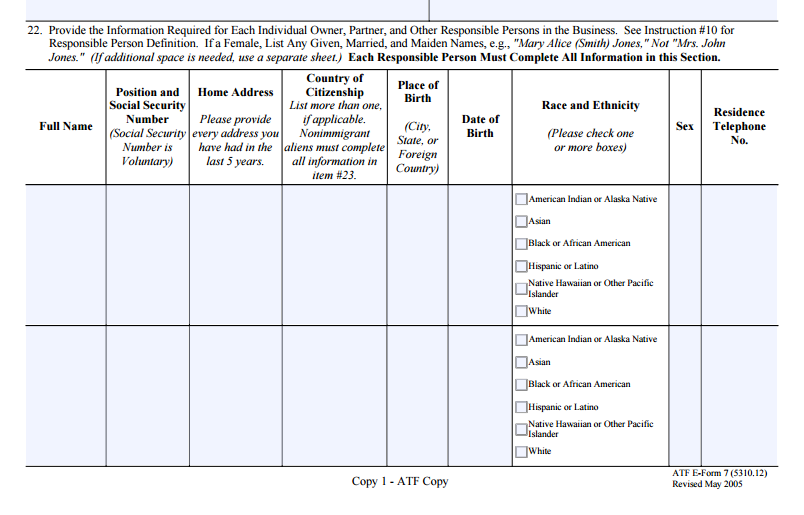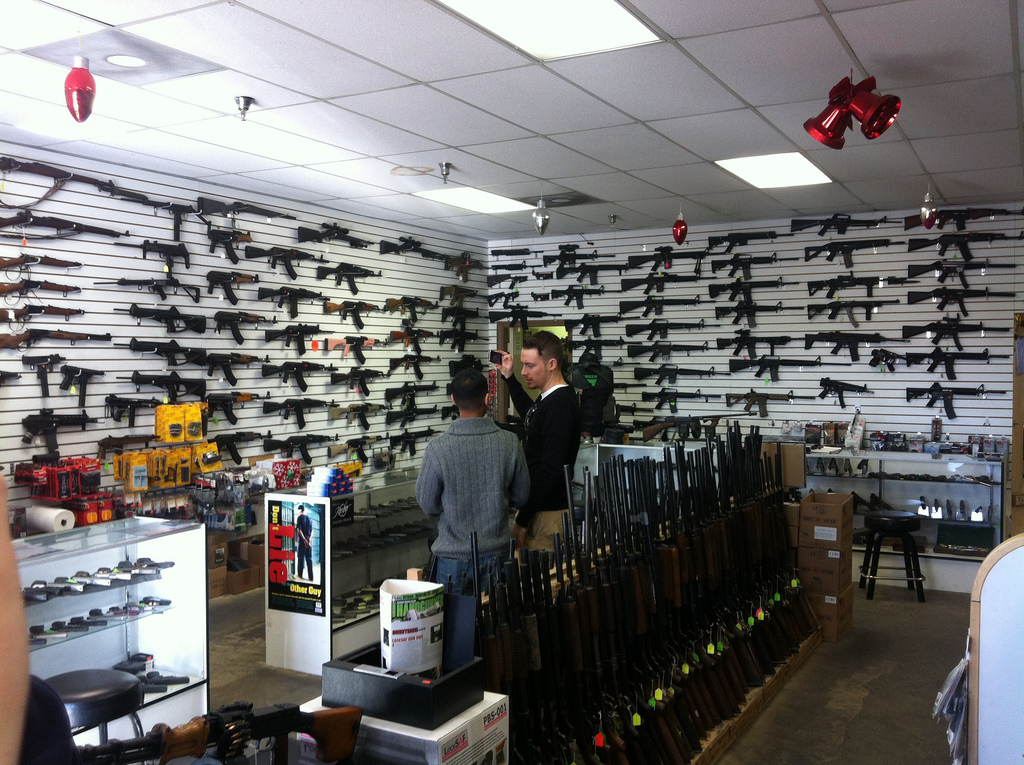
The “responsible persons” line on ATF Form 7 (your FFL application) can be a bit confusing. Here’s an explanation of responsible persons.
Gun laws and regulations can be… confusing. They’ve created a lot of misinformation.
As if legislation wasn’t hard enough to understand, sometimes the ATF is forced to interpret laws that were left vague. (Whether that vagueness is intentional or unintentional, who knows?) The best way to protect yourself and your business is to be as educated as possible.
One of the most commonly misunderstood terms in firearm sales is the “responsible person.” The ATF adjusted their definition of this term back in 2013, so even if you’ve heard it before, you should revisit it.
FFL “Responsible Persons”

If you recall ATF Form 7 (Application for a Federal Firearms License), “responsible persons” is defined in the instructions:
“A responsible person is: In the case of a corporation, partnership, or association, any individual possessing, directly or indirectly, the power to direct or cause the direction of the management, policies, and practices of the corporation, partnership, or association, insofar as they pertain to firearms.”
Even though we have the ATF’s definition of a “responsible person,” it’s still pretty vague. There’s no official definition in the Gun Control Act of 1968, so we have to go by the ATF’s interpretation from 18 U.S.C. §923(d)(1)(B).
Basically, anyone who will have management power of your business in regards to firearms should be listed as a “responsible person.” This person will have authority to speak with the ATF, apply for renewal, and even change the license. Whoever has authority over firearms in the business also has responsibility, as far as the ATF is concerned.
Anyone with management power of your business in regards to firearms is a “responsible person.”
Note that you don’t have to list persons who aren’t associated with firearms. Your financial officer may have managerial powers, but since he doesn’t deal with firearm sales, he isn’t required to be listed as a “responsible person.” (If that were the case, some companies would have hundreds of people listed on their application.)
Technically, “responsible persons” are designated on a case-by-case basis. During the FFL application review, ATF investigators make sure there you have included everyone who should be. But you can speed up the process by designating the right people.
Designating “Responsible Persons”
All applications must have a “responsible person.” Applicants are denied if that line is left blank. All “responsible persons” are required to submit background information to the ATF and have their fingerprints processed.
As the business owner, you will likely be one of the “responsible persons.” You can designate as many as you like on the application. There are some circumstances where the business owner wouldn’t be listed as a “responsible person” on the FFL.
For example, you might not list yourself on the FFL if you were in the process of selling the business but the license had to be renewed before the sale processed. In multi-store franchise situations, the store owners are often “responsible persons” on their own licenses, but the corporate managers are not. Absentee owners are another example; their general managers would be considered responsible.
Do not list just anyone as a “responsible person.” This person must be willing to treat your license as if it were their own. They will be expected to uphold all of the responsibilities as the license holder, and can even be subject to potential penalties (license revocation, fines, and even prison time for extreme violations). The ATF may contact any “responsible person” at any time and all “responsible persons” are expected to comply.
If you’re a sole proprietor, you will be your own “responsible person.” If you’re a partnership, you’ll probably have two persons. The ATF prefers that you list multiple people on the license. More people being responsible means a higher likelihood of compliance and communication with the bureau. In an LLC, anyone who is listed a manager is likely a “responsible person.”
In some cases, large businesses add key employees to their license. Businesses that have multiple stores or a significant online presence often employ a compliance office who might be listed as a “responsible person.”
During the application process, the ATF will ask questions about your business and may require certain individuals to be listed on the application. If your business grows between renewal periods, they may require the inclusion of new people in order to grant the renewal.
However, it’s not smart to wait for the ATF to decide who should be listed as “responsible persons.” It’s best to have an application package as complete as possible before sending it off to the ATF. Applications that can be approved without investigations or material changes are processed much faster, especially when they need to investigate the background of an additional person. Incomplete applications can create significant delays.
If you aren’t sure who should be a “responsible person” or who must be, you should speak to an attorney who deals regularly with federal firearms licenses.
Changing “Responsible Persons”

Image: Flickr / nez
Businesses change all the time. Employees come and go. Companies are bought and sold. People retire, change duties, or move on. In some respects, federal firearms licenses are fluid documents that can be changed depending on the growth of your business. Instead of paying the application fee every time your business makes a change (which can be quite burdensome, depending on your FFL type), you can write to the ATF detailing your requested adjustments.
If you wish to change the people listed as “responsible persons” on your FFL, you need to notify the ATF. It’s your job to make sure that someone working at your business is listed on your license at all times.
If the ATF investigates and discovers that the “responsible person” quit last month, you may receive a violation. This happens often with multi-store operations where the manager left or was reassigned and the business never got around to adjusting their license.
In many cases, it’s safer to assign more “responsible persons” than you feel are necessary for your business, just in case there’s a problem.
Any “responsible person” can add another “responsible person” to the license. You just need to write to the appropriate Federal Firearms Licensing Center (use this map to determine which is right for you). You do not need to submit another FFL application (Form 7).
In your letter, include fingerprint cards (special instructions from the ATF are here) and photographs, as well as personal information: full legal name, position, social security number, home address (including addresses the person has had for the last five years), country of citizenship, place of birth (city and state or foreign country), date of birth, race and ethnicity, sex, and home telephone number.
Final Thought
Naturally, a “responsible person” should be responsible. Choose people who have a vested interest in seeing your business succeed and are willing to take steps to ensure the preservation of your federal firearms license.
